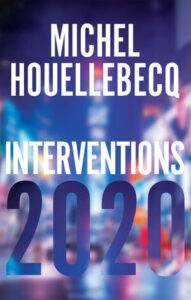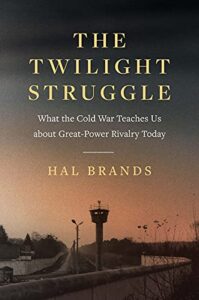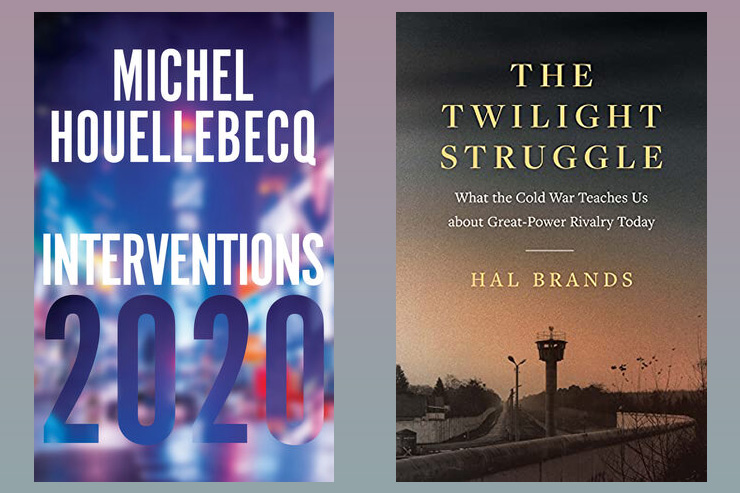
Interventions 2020, by Michel Houellebecq (Polity Press; 314 pp., $25.00). Besides being a notorious satirist and social critic in France, Michel Houellebecq is an avid recycler. At the front of the French edition of this book, he says that “55% of this volume already figured in the second edition of Interventions in 2009. This third edition thus consists of 45% new texts … There won’t be a fourth edition.” This disclaimer doesn’t appear in the English translation of Interventions 2020, because those earlier collections weren’t published in English. But today, Houellebecq has a high profile in the Anglophone world, mainly for such dystopian novels as Submission and Serotonin.
Interventions 2020 is a selection of articles, interviews, and notebook jottings aimed particularly at folks of a paleoconservative, or rightist, stripe. In “Donald Trump Is a Good President,” written for Harper’s (January 2019), Houellebecq seriously praises Trump for having no urge to charge into new international fiascos the way American presidents had done for decades: “The Americans are letting us be. The Americans are no longer trying to spread democracy across the planet.”
A short pensée, “Conservatism: a source of progress,” quotes the forgotten French Premier Henri Queuille: “There’s no political problem that can’t be resolved by inaction.”
An old, bruisingly funny essay concerns feminism and sex roles. Originally written in 1998 as an afterword to Valerie Solanas’s radical feminist SCUM Manifesto, its opening lines will give you the flavor:
For my part, I’ve always considered feminists to be amiable dimwits, harmless in principle, but unfortunately made dangerous by their disarming lack of lucidity. So, in the 1970s, you could see them fighting for contraception, abortion, sexual freedom, etc. … when the historical aim of men had obviously been to [bed] as many girls as possible without having to face the burden of a family.
Houellebecq’s personal favorite must be the lead chapter, “Jacques Prévert Is a Jerk.” It’s another golden oldie, recycled from the two earlier Interventions (1998, 2009). The author really has it in for poor Prévert, a poet and screenwriter whose public persona was as one of those divine-fool Frenchmen (think Charles Trenet, Jacques Tati) whom Houellebecq reflexively despises. Prévert “loved flowers, birds, the neighborhoods of old Paris … He wore a cap and smoked Gauloises.” Here is Houellebecq as Holden Caulfield, forever sneering at “phonies.”
(Margot Burns)

The Twilight Struggle: What the Cold War Teaches Us about Great-Power Rivalry Today, by Hal Brands (Yale University Press; 328 pp., $32.50). Brands has written an excellent book on an important subject. He recounts the Cold War in a remarkably compact and judicious manner, deriving lessons on how to handle the revival of great-power rivalry—now apparent even to the blind, with regard to both China and Russia. He does not fall into the traps of oversimplification, squeezing historical evidence to justify present-day policies, or imagining that the future will just repeat the past. In other words, we cannot simply “rerun the Cold War playbook.”
American Cold War strategy, Brands argues, was basically wise, but “containment” was messier, more difficult, and more controversial than many care to recall, with reverses and unpleasant episodes, and indeed a very long disastrous stretch in the 1960s and 1970s. When it was successful, it was not just holding the line but creating advantages. It was not necessarily countering every Soviet strength but using asymmetrical efforts, playing our strengths against the other side’s weaknesses—especially in deploying Western technological innovation and in relying on the superior values of the West.
Nevertheless, we cannot depend on our being “nicer” to foil our foes; we must engage when necessary in political warfare. We cannot just opt out of entanglements in the so-called Third World, simply reject unlikable allies and either bully or ingratiate ourselves to our close democratic partners. Brands barely alludes, however, to the rather obvious demoralization—or sheer rot—in our own society, which is sure to complicate any effort at managing external foes.
In recounting the Cold War, Brands awards high marks to Truman, Eisenhower, Reagan, and—rather unjustifiably, in my view—Bush. Reagan, he remarks, developed a “surprisingly sophisticated strategy,” though as Brands notes, the president was lucky to encounter a Soviet leader who, while more moderate and reasonable than his predecessors, was grossly incompetent at home, implementing reforms that turned a crisis of the Soviet system into a catastrophe. Imagine if the Politburo had selected an abler man than Gorbachev or if the coup of 1991 been better managed. The Cold War might still be going on. This should remind us of the roles of contingency and personality in human conflict.
(Alan J. Levine)

Leave a Reply